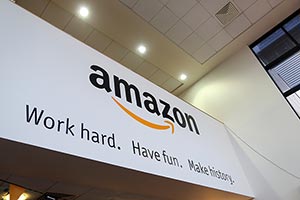Amazon Acquires 9.99% of Air-Cargo Partner ATSG

Amazon is rapidly exercising the right to buy 9.99% of Air Transport Services Group, a sign the Seattle tech giant plans to look over the shoulder of its air-cargo partner from the get-go as they jointly work out new ways to haul Amazon merchandise across the United States.
Two weeks ago, ATSG agreed to run an ambitious airfreight service operation for Amazon out of ATSG’s Wilmington, Ohio, hub.
The agreement, which followed months of secret testing with a few planes, includes the leasing of 20 Boeing 767 freighter jets by ATSG to Amazon.
The big fleet will connect Amazon’s far-flung fulfillment centers at a time the company seeks to speed up delivery of items while keeping its transportation costs under control.
As part of the deal, ATSG gave Amazon the right to acquire up to 19.99% of its outstanding common shares over the next five years.
In a filing with the Securities and Exchange Commission recorded March 18, Amazon reported the acquisition of 7.1 million shares of common ATSG stock.
The rules of the agreement give Amazon one seat on ATSG’s board once the company obtains at least 10% of the shares. It’s unclear if Amazon and ATSG consider whether the ownership threshold disclosed March 18 meets that requirement. Neither Amazon nor ATSG responded to requests for comment.
Amazon will be able to buy 5.12 million more shares upon ATSG’s reaching certain milestones, and additional vestments are scheduled over time. At the agreed-upon price of $9.73 per share, Amazon’s 9.99% stake represents a $69 million investment — but it’s worth $103 million at March 18 market prices.
Amazon’s ownership of a significant chunk of ATSG stock gives the air-cargo company a cash infusion and Amazon a valuable perch from where to learn the airfreight business.
ATSG executives said in a March 9 earnings call that Amazon insisted on partial ownership as part of the deal. Amazon is building a transportation network to complement the logistics service it gets from FedEx Corp., UPS Inc. and other providers, and that Amazon says is not enough to meet its fast-growing demands.

